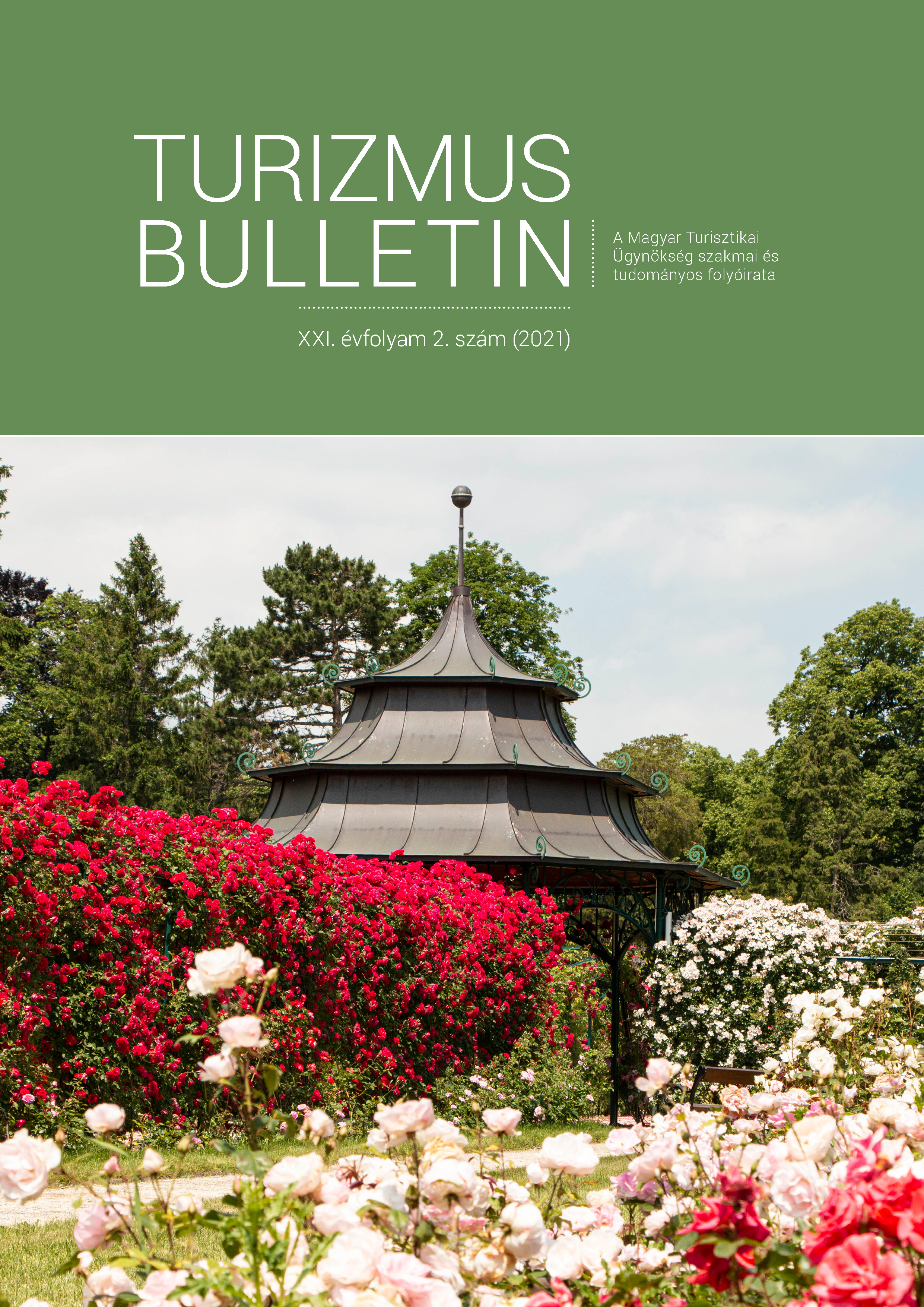The primary analysis of the tourism consumption habits of the international students studying in Hungary
DOI:
https://doi.org/10.14267/TURBULL.2021v21n2.2Keywords:
international students, tourism consumption habits, Hungary, economic impactAbstract
This study surveys and summarizes the research results related to the tourism consumption habits of international students studying in Hungary together with their visitors. With questions focusing on the travel habits of the international students, the research, carried out by questionnaire survey, was intended to show the scale of this segment in Hungarian tourism and the economic impact also. In relation to the publication of the results, we can confirm that no similar research has been carried out yet in Hungary, and so the analysis of the role of international students in the social-economic and touristic processes is a scientific novelty in Hungary. Our primary results show that the segment plays an active part in domestic tourism, and so, since a clear recognition of this significant target group has recently emerged. The authors recommend the elaboration of a related tourism marketing strategy on national and university city levels.
References
ÁRVA L. – VÁRHELYI T. (2020): Elmozdulás a minőségi turizmus felé. A fenntarthatóság a turizmusban a koronavírusjárvány után. Polgári Szemle. 16(1-3). pp. 94–114. DOI: 10.24307/psz.2020.0707
BROOKS, R. – WATERS, J. (2011): Student Mobilities, Migration and the Internationalization of Higher Education. Palgrave Macmillan, Basingstoke.
BUTCHER, A. (2002): A Report on the Demographic, Social and Economic Impact of International Students on North Shore City. Auckland: School of Social and Cultural Studies, Massey University.
FÜZESI ZS. – TISTYÁN L. (2013): Külföldi diákok egy egyetem és város életében. Területfejlesztés és Innováció. 2013/3. pp. 11–17.
LEVENT, F. (2016): The economic impacts of international student mobility in the globalization process. Journal of Human Sciences. 13(3). pp. 3853–3870. DOI: 10.14687/jhs.v13i3.3877
LÓPEZ, X. P. – FERNÁNDEZ, M. F. – INCERA, A. C. (2016): The Economic Impact of International Students in a Regional Economy from a Tourism Perspective. Tourism Economics. 22(1). pp. 125–140. DOI: 10.5367/te.2014.0414
LANGERNÉ RÉDEI M. (2009): A tanulmányi célú mozgás. Akadémiai Doktori értekezés. Reg-Info Kft., Budapest.
M. CSÁSZÁR ZS. – ALPEK L. (2018): A nemzetközi hallgatók vidéki egyetemvárosokra gyakorolt gazdasági szerepe Magyarországon Pécs példáján. Közép-Európai Közlemények. 11(2). pp. 30–41.
M. CSÁSZÁR, ZS. – TEREPICS, K. – WUSCHING, Á. T. – GYŐRI, F. – ALPEK, L. – CZIMRE, K. – SÁLYI A. – KOLTAI, A. (2019): The impact of the spending habits of international students on the economy of University cities – case study: Hungary. Interdisciplinary Management Research. 15. pp. 562–585.
M. CSÁSZÁR ZS. – WUSCHING Á. T. (2016): A felsőoktatás nemzetköziesedésének hatása az egyetemvárosok fejlődésére egy pécsi esettanulmány tükrében. Földrajzi Közlemények. 2016(3). pp. 245–257.
M. CSÁSZÁR ZS. – WUSCHING Á. T. (2018): A külföldi hallgatók jelenlétének nemzetgazdasági hatása In.: Reményi, P. – Vers R. (szerk.): X. Magyar Politikai Földrajzi Konferencia: Az iszlám és Közép-Európa. Geopolitika és migráció. pp. 20–28.
MICHALKÓ G. – BALIZS D. – KISS É. – FARAGÓNÉ HUSZÁR SZ. – SIK A. – KARÁCSONYI D. (2017): A vidékiesség vonzásában: a nagyvárosi agglomerációk láthatatlan turizmusa Magyarországon. Tér és Társadalom. 31(3). pp. 44–61.
MICHALKÓ G. – ILYÉS N. (2020): A nemkonvencionális turisztikai mobilitás magyarországi sajátosságai, különös tekintettel a turizmusból származó bevételek növelésének lehetőségére. Turizmus Bulletin 20. Különszám. pp. 6-18.
MONTANARI, A. – STANISCIA, B. (2014): International Tertiary Students: is Rome an Attractive Destination? Eurolimes. 17. pp. 169– 183.
ORTIZ, A. – CHANG, L. – FANG, Y. (2015): International Student Mobility Trends 2015: An Economic Perspective. World Education News & Reviews. February 2015.
RÉDEI M. (2006): Tanulási célú migráció a világban és itthon. Demográfia. 49(2–3). pp. 232–250.
RÉDEI M. (2007): Mozgásban a világ: a nemzetközi migráció földrajza. ELTE Eötvös Kiadó Kft., Budapest.
RODRIGUEZ, X. A. – MARTINEZ-ROGET, F. – PAWLOWSKA, E. (2012): Academic Tourism Demands in Galicia, Spain. Tourism Management. 33(6). pp. 1583–1590. DOI: 10.1016/j.tourman.2012.01.010
YAO, L. – BAI, Y. (2008): The sustainability of economic and cultural impacts of international students to regional Australia: The case of Bendigo. Humanomics. 24(4). pp. 250–262. DOI: 10.1108/08288660810917132
Internetes források
AUSTRALIAN GOVERNMENT (2016): The value of international education to Australia 2016. https://internationaleducation.gov.au/research/research-papers/Documents/ValueInternationalEd.pdf, Letöltve: 2020. július 8.
BAUMGARTNER, J. L. (2018): The Economic Value of International Student Enrollment to the U.S. Economy – A Methodology. https://www.nafsa.org/sites/default/files/media/document/isev-methodology-2019.pdf, Letöltve: 2019. november 20.
GRASSET, D. C. – MENÉDEZ, G. B. (2017): The Economic Impact of International Students in Spain. http://www.ebspain.es/pdfs/02_2018/Economic_Impact_2017_Study_December13_2017_FINAL.pdf, Letöltve: 2019. november 5.
INFOMETRICS (2016): The Economic Impact of International Education in New-Zealand 2015/2016. https://enz.govt.nz/assets/Uploads/The-Economic-Impact-of-International-Education-in-New-Zealand-2015-2016.pdf, Letöltve: 2019. október 24.
KSH (2020): Összefoglaló táblák (STADAT) – Idősoros éves adatok – Turizmus, vendéglátás. http://www.ksh.hu/stadat_eves_4_5, Letöltve: 2020. augusztus 20.
LONDON & PARTNERS (2007): The economic impact of London’s international students. http://www.londonhigher.ac.uk/wp-content/uploads/2017/02/Studentsimpactreport_2015.pdf, Letöltve: 2019. október 20.
LONDON & PARTNERS (2018): The Economic Impact of London’s International Students, https://files.londonandpartners.com/l-and-p/assets/economic_impact_of_londons_international_students_2018.pdf, Letöltve: 2019. november 7.
LONDON ECONOMICS (2018): The costs and benefits of international students by parliamentary constituency – Report for the Higher Education Policy Institute and Kaplan International Pathways. https://www.hepi.ac.uk/wp-content/uploads/2018/01/Economic-benefits-of-international-students-by-constituency-Final-11-01-2018.pdf, Letöltve: 2019. október 28.
MÜNCH, C. – HOCH, M. (2013): The Financial Impact of Cross-Border Student Mobility on the Economy of the Host Country. Executive Summary. Prognos AG, Deuscher Akademischer Austausch Dienst (DAAD). https://siesca.uned.ac.cr/images/publicaciones/Financial_impact_of_cross-border_student.pdf, Letöltve: 2019. november 20.
VICKERS, P. – BEKHRADNIA, B. (2007): The Economic Costs and Benefits of International Students. Higher Education Policy Institute. https://www.hepi.ac.uk/wp-content/uploads/2014/02/32Economiceffectsofinternationalstudents.pdf, Letöltve: 2019. október 30.

